|
|
|
Sort Order |
|
|
|
Items / Page
|
|
|
|
|
|
|
| Srl | Item |
| 1 |
ID:
132897
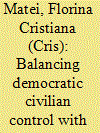

|
|
|
|
|
| Publication |
2014.
|
| Summary/Abstract |
This article reviews Romania's intelligence reform after 1989. Specifically, it looks at intelligence reform before and after Romania's accession to the North Atlantic Treaty Organization (NATO) in 2004, and the European Union (EU) in 2007. It finds that Romania has made considerable progress in intelligence reform. That is because Romania, which expressed its desire and commitment to join NATO/EU after 1989, has worked hard to comply with these organizations' membership demands (including intelligence reform). After NATO/EU integration (when demands on balancing control and effectiveness virtually vanished), despite continued openness efforts made by agencies, control/oversight diluted. Thus, post-NATO/EU, while effectiveness is being strengthened, democratic control lessens.
|
|
|
|
|
|
|
|
|
|
|
|
|
|
|
|
| 2 |
ID:
112217
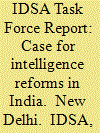

|
|
|
|
|
| Publication |
New Delhi, IDSA, 2012.
|
| Description |
112p.
|
| Standard Number |
9789382169031
|
|
|
|
|
|
|
|
|
|
|
|
Copies: C:2/I:0,R:0,Q:0
Circulation
| Accession# | Call# | Current Location | Status | Policy | Location |
| 056519 | 327.1254/IDS 056519 | Main | On Shelf | General | |
| 056520 | 327.1254/IDS 056520 | Main | On Shelf | General | |
|
|
|
|
| 3 |
ID:
107245
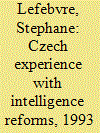

|
|
|
| 4 |
ID:
132895
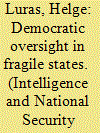

|
|
|
|
|
| Publication |
2014.
|
| Summary/Abstract |
In most transition countries the main aim of 'democratizing intelligence' is to weaken the authoritarian governmental structures by introducing more transparency, legality and oversight. In Bosnia and Herzegovina however, the state-building efforts driven by international parties combined formal democratization processes such as independent oversight with the strengthening and operational capacity building of previously weak-to-non-existent intelligence structures. In parallel with the descent into war when Yugoslavia collapsed in the early 1990s, the State Security Service (SDB) in the Republic of Bosnia had split into three ethnically-based outfits answering to the political and military leaders of war. 'Democratization' of intelligence in Bosnia and Herzegovina since the establishment of a unified, state-level Intelligence and Security Agency (OSA) in 2004 has followed its own unique path reflecting the fragmented nature of politics in Bosnia and the leading role of international organizations in proposing and effectuating institutional reforms. Nevertheless, in terms of habits, operational methods and values many Bosnian intelligence officers went through similar adaptations and transitions as their colleagues in countries where institutions at the time of democratic transition were too strong and authoritarian rather than, as in the case of Bosnia, being deemed too weak and ineffectual.
|
|
|
|
|
|
|
|
|
|
|
|
|
|
|
|
| 5 |
ID:
137584
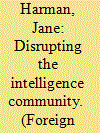

|
|
|
|
|
| Summary/Abstract |
Some 40 years have passed since the Church Committee’s sweeping investigation of U.S. intelligence practices, fresh on the heels of the Watergate scandal. And ten years have gone by since the last major reorganization of the country’s spy agencies, enacted in the wake of 9/11. Both efforts led to a host of reforms—among them, the creation of the Senate and House Intelligence Committees, the passage of the Foreign Intelligence Surveillance Act (FISA), and the adoption of the Intelligence Reform and Terrorism Prevention Act, which I helped shepherd through Congress.
|
|
|
|
|
|
|
|
|
|
|
|
|
|
|
|
| 6 |
ID:
116383
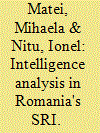

|
|
|
|
|
| Publication |
2012.
|
| Summary/Abstract |
Most intelligence establishments today speak about transformation and about choices among alternatives to improve efficiency, tackle new challenges to national and international security, and offer the best products to their customers. Such plans generally entail a large variety of reforms, ranging from changes in institutional architecture to the enhanced use of new technologies or new managerial tools for improving communication and interaction within the intelligence organizations. Thus, the same overall or strategic concerns trigger a variety of reforms in the different intelligence organizations.
|
|
|
|
|
|
|
|
|
|
|
|
|
|
|
|
| 7 |
ID:
116349
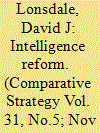

|
|
|
|
|
| Publication |
2012.
|
| Summary/Abstract |
In recent years the intelligence communities of the United States and the United Kingdom have faced a rapidly changing security environment. In that time, a number of high-profile failures have exposed weaknesses within these communities and how they perform their tasks. This article analyses these failures, identifying the key problems, and examines the various reforms designed to overcome the identified weaknesses. These reforms are discussed in three categories: structural change, budget increases, and increased oversight procedures. The article concludes with an assessment of whether said reforms have produced intelligence communities ready for the new security environment.
|
|
|
|
|
|
|
|
|
|
|
|
|
|
|
|
| 8 |
ID:
104722
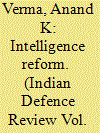

|
|
|
| 9 |
ID:
139509
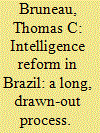

|
|
|
|
|
| Summary/Abstract |
In our edited book, Reforming Intelligence: Obstacles to Democratic Control and Effectiveness, Steven Boraz and I argued that intelligence should be analyzed as a subset of civil–military relations. In addition to the three reasons given there—that intelligence is a monopoly of the military in most non-democratic regimes; that even in older democracies including the United States the military plays a very large role in intelligence; and that both exist to ensure national security—another can be added, at least in the case of Brazil, that while democratic civilian control has been achieved, minimal attention and commitment are given to achieving effectiveness.
|
|
|
|
|
|
|
|
|
|
|
|
|
|
|
|
| 10 |
ID:
092978
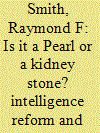

|
|
|
|
|
| Publication |
2009.
|
| Summary/Abstract |
A July 1990 cable from the US Embassy in Moscow that anticipated the collapse of the Soviet Union is a case study for an analysis in this article that seeks to make three points: 1) major failures in intelligence analysis are more likely to result when all elements of the intelligence community speak with one voice than when they disagree; 2) embassy reporting can play an essential role independent of that of the intelligence community in shaping Washington thinking about international events, but a variety of developments have made this increasingly difficult; 3) probability analysis plays too great a role in intelligence products and risk management too little.
|
|
|
|
|
|
|
|
|
|
|
|
|
|
|
|
| 11 |
ID:
131045
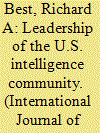

|
|
|
|
|
| Publication |
2014.
|
| Summary/Abstract |
Intelligence agencies exist to support government officials with information and analysis; unlike some academic institutions, they do not exist simply to promote the greater diffusion of knowledge. Intelligence officials serve a wide array of masters-Presidents, diplomats, policy planners, military commanders, and other government officials. In the United States, the need to support these diverse masters has brought into existence a complicated and cumbrous community of some seventeen organizations. 1 These agencies have been created over many years to describe and analyze the international environment and, ideally, give advance warning of imminent developments.
|
|
|
|
|
|
|
|
|
|
|
|
|
|
|
|
| 12 |
ID:
066667
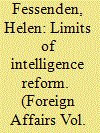

|
|
|
| 13 |
ID:
114207
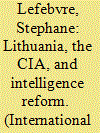

|
|
|
| 14 |
ID:
111618
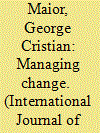

|
|
|
| 15 |
ID:
111615


|
|
|
| 16 |
ID:
107243
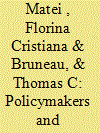

|
|
|
| 17 |
ID:
119415
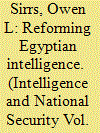

|
|
|
|
|
| Publication |
2013.
|
| Summary/Abstract |
In 2011 intelligence reform became a timely and pertinent topic in Egypt with the overthrow of President Hosni Mubarak by mass demonstrations. Yet two outstanding questions persist: can Egyptian intelligence be reformed? What would intelligence reform entail in the Egyptian context? An examination of historical Egyptian intelligence reforms suggests that 'reform' in the Egyptian context usually means greater efficiency and centralization at the expense of public oversight and accountability. Prospects for fundamental intelligence reform are further hampered by Egypt's authoritarian traditions, its relatively weak legislature and judiciary, lack of an empowered civil society, censorship and an apparent official addiction to secrecy.
|
|
|
|
|
|
|
|
|
|
|
|
|
|
|
|
| 18 |
ID:
171254
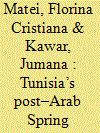

|
|
|
| 19 |
ID:
145592
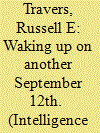

|
|
|
|
|
| Summary/Abstract |
After 9/11 the US Government tried to ‘fix’ intelligence by adopting the Intelligence Reform and Terrorism Prevention Act (IRTPA). Resources increased and, to varying degrees, performance improved – particularly in counterterrorism. This article, however, argues that the constellation of Intelligence Community authorities and organizations, either created or left in place by the IRTPA, coupled with the challenges of a complex security environment, leaves us ill-prepared to deal with the Country’s twenty-first century intelligence requirements. Should that critique prove accurate, and should future intelligence failure(s) be judged strategically and politically unacceptable, the second half of the article provides a framework for revising the IRTPA; the proposals substantially increase the authority of the head of the Intelligence Community, consolidate structures, and create centers of analytic critical mass necessary to meet the knowledge requirements for both regional and transnational security issues. Reflecting the Intelligence Community’s long standing tradition of questioning assumptions, the article is meant to foster reflection and debate about whether the Intelligence Community is postured to meet the needs of the Country, and if not, what needs to change.
|
|
|
|
|
|
|
|
|
|
|
|
|
|
|
|
|
|
|
|
|